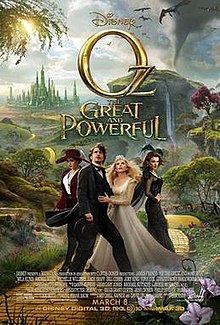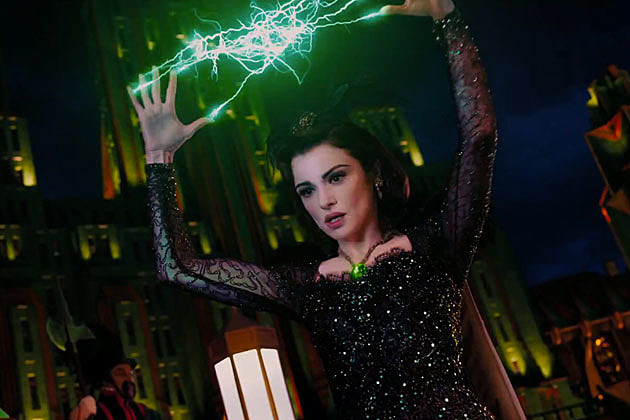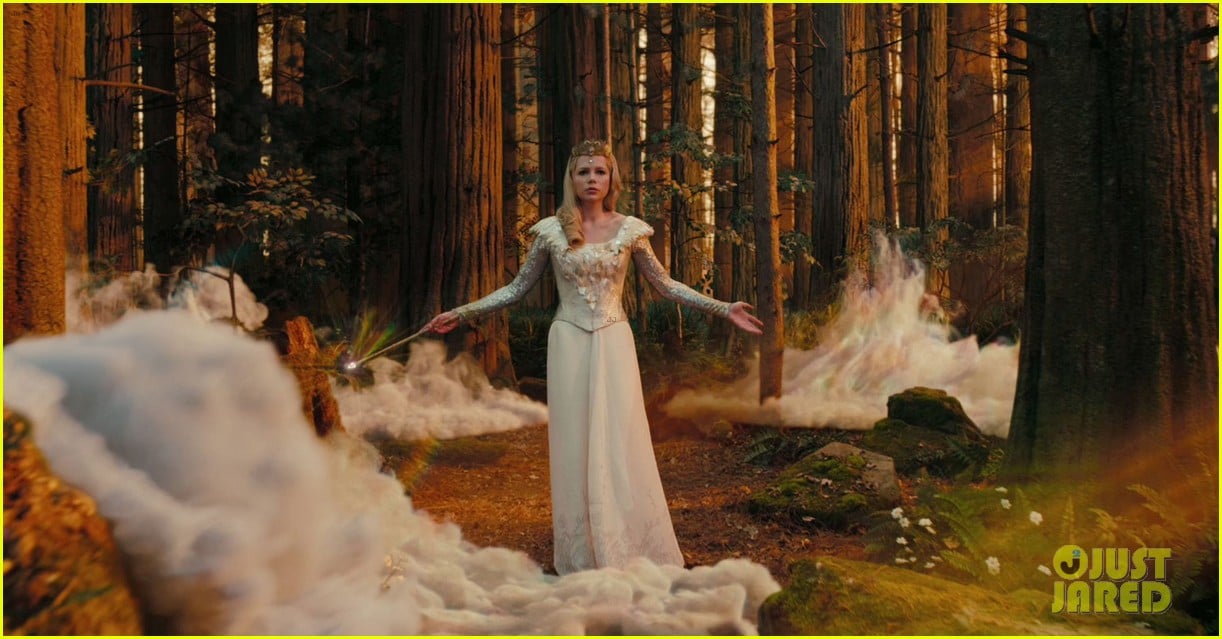Tuesday, March 19, 2013
My Take on Oz, the Great and Powerful
I went to see the new Oz movie and was surprised by how much I liked it. I was expecting another forced epic journey extremely loosely based on literature using special effects to try and wow the audience. I was impressed by the levels of meaning and symbolism throughout the film, and throughout the rest of the day was discussing what certain things in the story meant-how the characters in Oz represented characters from Kansas and how Oz had an opportunity to redeem those relationships; what the film had to say about goodness vs. greatness, naivety and deception, and where true power lies. It was also fun to see another setup of the events we're familiar with in The Wizard of Oz, an alternative to Wicked.
So I was surprised to see the title of this article, linked on Surlalune, Why ‘Oz the Great and Powerful’ Is A Major Step Back For Witches and Women. The major points in the article are: 1. The Wizard of Oz has multiple sequels, so Hollywood should be exploring those rather than making more prequels 2. Baum was a feminist, and all of his heroines were females, so it's unfortunate that Hollywood should go back to making a male the center of attention.
As for the first point, the sequels are so unknown I can definitely see that it would be difficult to drum up excitement for a movie of one of those books. I loved the book Wizard of Oz and have read a couple of the other books in my childhood but that didn't stop me from enjoying both Oz and Wicked. One of the reasons I really love new interpretations of fairy tales is when they take well-known elements from fairy tales and come up with an explanation for why or how that came to be. Oz prequels do the same sort of thing-Wicked was exploring the "why"s of how the Wicked Witch of the West came to be the way she is, what made her so obsessed with her sister's shoes, what it would have been like for her to grow up with green skin. And this movie was exploring a different set of "why"s-how did Oz get to Oz anyway? How did he end up deceiving everyone behind a smokescreen? This movie presents a plausible (mostly plausible, anyway) explanation for that aspect of the story, as well as going into the relationships between the sister witches and why the Munchkins were so happy when Dorothy eventually landed on the Wicked Witch of the East when she arrives years later.
As for the second point, it was very interesting to read the history of Baum and his feminism. I think it's really cool that he intentionally made his main characters females and never had them get involved in romantic relationships.
But can a woman expect men to get excited about stories with female leads if we are offended by the mere fact that a man is the lead in another story? Granted it makes a difference when viewing it in context, but it seems like we judge characters seeing only through the lense of gender. If I as a modern woman have to be told why I should be offended before I get upset about characters in a movie I just saw, is it really that offensive?
Elisabeth Rappe points out that the witches of Oz come across powerless in their reactions to the Wizard-lauding him as the one who will save them. The only one who truly does this is Theodora, and she as a character is naive. Not only that, but though she is a witch from the beginning, we never see her using her power for good. She passively wants peace and only uses her powers to get revenge in a series of impulsive decisions. I thought she was an interesting character with challenging implications.
Evanora is intentionally trying to deceive Oz, so she plays into his vanity and greed in order to control him. Glinda sees through him and wants to use him and the prophecy to give her people hope for defeating the witches. I think she overall is a very strong character-she blends concern for her people with wisdom, and she is powerful-I loved the part where Evanora says, "what's the matter? Run out of bubbles?" and Glinda responds "bubbles are just for show" and they proceed to have an electric flying wand fight that reminds me of the Harry Potter wand fights.
Plus, the Little China Girl is a plucky heroine. She stubbornly convinces Oz to take her on his journey, saying, "I'm not as delicate as I look!" as she kicks him in the shin. She ends up being instrumental in freeing Glinda from Evanora later.
So I'm not saying I totally disagree with the article. It would be great to have more strong female heroines-if only Hollywood could realize that strong heroines aren't necessarily just sword-weilding. But I feel like I connect with characters regardless of gender and I personally enjoyed the movie. I must seem like I'm coming across as anti-feminist, especially with my recent post on Disney's Snow White, which I swear I'm not. Sometimes it seems like the academic world has become a little too hyper-feminist. I just wanted to put out my two cents, that as a female I did not feel offended by this movie until I read up on the history of its source. Even then, each reinterpretation of a fairy tale or classic fantasy literature should be seen as it stands alone, and as it stands in the history of that story. I'm sure the filmmakers never intentionally changed from female to male heroes, but unconsciously our culture/Hollywood has produced a new trend in this story that in turn reveals something about our culture.
By the way, for the record I didn't like that Oz got Glinda in the end-I thought she was too good for him.
Readers, have you seen the movie? What did you think of it? And of the article? I will be out of town for a bit and though I hope to schedule an extra post or two I won't be following up on comments for a while, but please feel free to discuss
Subscribe to:
Post Comments (Atom)







We're hopefully going to see it Sunday. I'm looking forward to it as just a fun movie.
ReplyDeleteNO, you don't come across as anti-feminist. I often feel tempted to run in that direction, as a reaction against the hyper-feminism you mentioned, but you've kept well-balanced and open-minded.
ReplyDeleteSo far, I've only heard that the movie was "meh," a lot of show without the meat, so it's good to hear about it from a fairy tale perspective rather than a Hollywood one.
I don't think that the concept of the movie was bad at all. I think the portrayal of ALL the characters was fairly weak, and I wouldn't say I enjoyed the movie overall, but I don't think that the women were portrayed any worse than the men. My problems with the movie, though they were many, were all to do with the execution -- I was still hopeful about the concept itself all the way up until about half way through the movie, when I thought, "If one more person starts crying I'm going to barf!" Well... something like that.
ReplyDeleteI read your review and the one that you linked to before I saw the movie, and having seen them, I kind of agree with both. I think the important thing to remember is that Sam Raimi is best known for a cult classic B movie and a superhero action flick. My theory now is that he decided to make a kids' movie and didn't really know where to land. On the one hand I think kids would really like seeing Oz (the land) this way; on the other hand there aren't any other kid movies that I can think of where the main character kisses almost every female that ever comes on screen.
So yeah... although I think this story in itself is an interesting idea, the execution wasn't particularly sharp. I think it's a little too much Wonderland, and a lot of what made the land of Oz unique got lost in the CGI spectacle.
You have written a nicely thought out review--and I'm glad to see a response to the rather off-base SurLaLune article.
ReplyDeleteI thought the movie was very pretty and decently amusing. One of the reasons I saw it on the big screen was for the visuals, and for the most part, I wasn't disappointed.
However, I found the main issue was with the character of "Oz" himself. In all of the Wizard of Oz books and adaptions, he has been an unrepentant con artist, and I find that kind of character very difficult to root for.
An excerpt from my review:
"To be fair, Oz the Great and Powerful does show that the Wizard has a change of heart. Instead of using his powers of lying and trickery for evil, he uses them to trick the evil witches, and the people of Oz, in order to save the Emerald City. So, in other words, he lies and tricks others for good.
Right. It’s hard enough to deal with politicians in real life–now I see one glorified on the big screen as well, and fully supported by a sweet/sexy PR representative in the form of Glinda the Good."
So it's not a matter of "are the females bad/weak" as much as a "why are we cheering for this guy again?"
Pleased to join this conversation!
Here is my full review: http://thequietpen.wordpress.com/2013/03/16/oz-the-great-and-powerful-a-comparison-of-wizards/
Thank you all for your comments!
ReplyDeleteChristie-I hope I didn't get anyone's hopes up too high! I was going into it with low expecations so that affected how I viewed it. Very glad that you think I come across as balanced and open-minded.
Richlayers-I agree that it seems like the movie's intended audience isn't that clear. I almost feel like they were trying to appeal to all audiences, but in a sense that made it weaker because it was a little too adult to be child friendly but also not quite mature enough to be a really excellent adult movie. And yeah, I guess there is a lot of crying :)
TheQuietPen-I enjoyed reading your review of the movie! In fact one of the discussions we had after seeing the movie was, "since Glinda also uses deception, is she really any better than Oz or Evanora?" We came to the conclusion that she was using the prophecy and the appearance of Oz to give the people hope, and never really fully deceived them since they were part of the wizard's unconventional battle plans. She, and the people, had to make the best out of a situation that was completely different than they expected. Instead of might, creativity and teamwork won the day, a theme I never seem to get tired of.